Seed Activism: Patent Politics And Litigation In The Global South
Report of the book talk organised by ESG
on 13th December 2022
(Video recording of this event is accessible at: https://tinyurl.com/seedactivismbook)
(Download the pdf version of this report here)
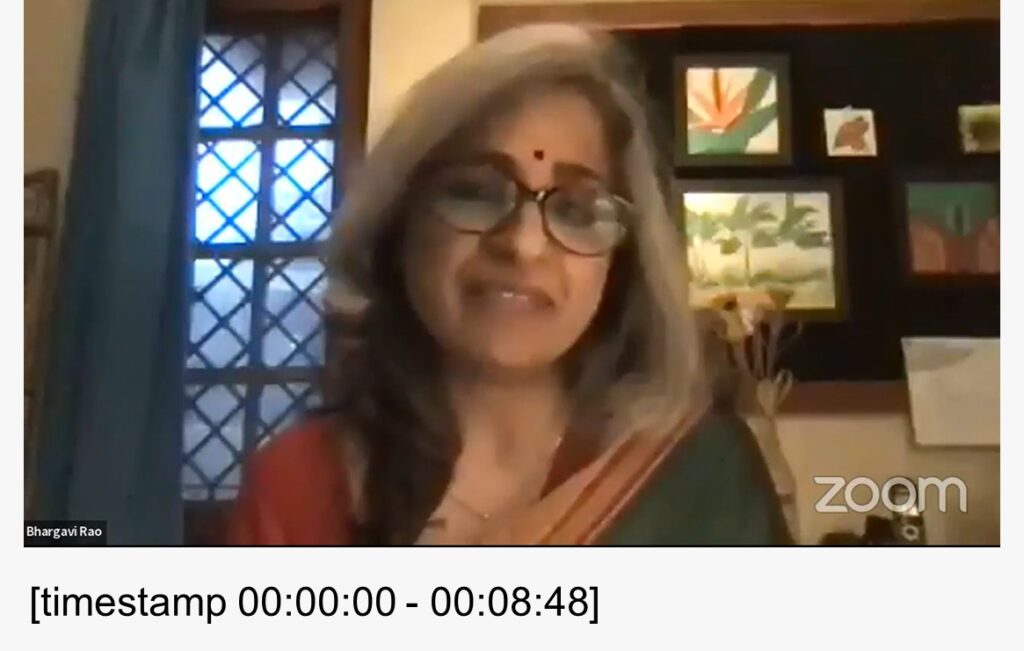
Bhargavi Rao, Senior Fellow and Trustee of ESG, opened the session by speaking about the unprecedented times that we are currently living in, with threats to human lives as well as other species, which she states is essentially our own doing: drawing attention to the 2019 IPBES Report which declared that nearly 1 million species are on the verge of extinction caused by anthropogenic activities, essentially extractive and financialised industrial development – the first time this has occurred in the life of this living planet. In which context, given climate change induced biodiversity losses, it might seem we are at a point of no return, particularly given conflicts over natural resources and resulting in various forms of displacement. As large human populations suffer from nutritional insecurity and diseases, due to lack of wholesome and healthy food, privatisation of commons – such as forests, pastures, water bodies and seeds, is also worsening the quality of our food basket.
From being a society which collected, preserved, worshipped and reused seeds, passing them down to future generations – we are now at the mercy of seed companies and corporations, Bhargavi said. Lawsuits over seed contract infringements and the irreversible damage hybridisation, genetic modification and chemicalization does to seed purity, are striking at the very core of farming and our existence, she warned.

She introduced Karine E. Peshard’s book Seed Activism as one that delves into various issues of ownership of seeds and consequences of evolving paradigms which bracket them as sprouting out of laboratories, not natural and farm settings. The book is an excellent historical, ethical, socio-cultural, environmental and political critique encompassing multiple dimensions of seed sovereignty, as well as agendas of capitalist forces who profit from such financialising and commodifying paradigms of the commons, Bhargavi shared.

Karine Peschard introduced her book as a comparative legal ethnography of court challenges on private intellectual property (IP) rights of biotech crops in Brazil and India, which is a part of a larger legal activism around plant genetic resources. Her story starts in 2004 when she witnessed a farmers’ protest in Paraná, Brazil, where they marched bound by chains, carrying huge bags of seeds with names of seed companies such as BASF, Monsanto, etc., and finally burnt them to be relieved of the burden. Moving 10 years ahead, she is keen to understand how biotech patents and royalties related legal challenges play out in Brazil and India, as opposed to North America, considering the difference in legislation and agricultural practices, as well as the fact that IP patents are more controversial in these countries. She worked on three cases involving GM crops.
In Brazil, they were exploiting farmers by making them pay royalties on Roundup Ready Soybean harvests, if they could not prove purchase of certified seeds. This was legally contested by the farmer’s union, and the Brazilian Supreme Court (SC) in 2019 ruled in favour of Monsanto, thus not allowing farmers to save and replant seeds with patented traits, and quite strangely also extending property rights to the harvest.
In India, exorbitant (75%) royalties and seed prices were being paid by farmers in spite of Monsanto not having a patent on the Bt. gene. When the government intervened and slashed prices, Monsanto filed multiple lawsuits in different states. In one of the cases against Nuziveedu (Sub-Licensee of Monsanto), which was about contract breach and patent infringement, the Delhi High Court ruled that Bt. cotton seeds were not patentable in India. A further appeal by Monsanto in the SC was settled out of court in 2021 after Bayer acquired it. They agreed to fix royalties 5-20% of seed value. This settlement preempted the High Court and Supreme Court from a ruling regarding the patentability of plant related inventions under Indian law, and thus this critical area continues to remain a grey area in India.

Bt. brinjal, which was proposed for commercial release in 2009 is currently placed under a moratorium. A public consultation that had taken place when this proposal unfolded, revealed that a number of local varieties were used by developers for this GM crop without authorization of National Biodiversity Authority (NBA), thereby committing an act of biopiracy – which is a criminal offence in India. A PIL filed by ESG in the Karnataka High Court sought direction over lack of action from NBA in tackling this biopiracy shed some light on the lack of application of the Biological Diversity Act, 2002 (BDA).
This compelled the NBA to file a criminal case against Monsanto, Mahyco, et al in 2013 before the Dharwad JMFC Court. An appeal (Crl P 10002/2013) by the accused demanding this complaint be quashed was rejected by the Karnataka HC on 11th October 2012 by Justice Mr. Pachhapure who ruled developers prima facie had egregiously violated the Biodiversity Act. However, on 3rd February 2014 this well reasoned order was stayed by the Supreme Court, which is effective to date. Meanwhile, sidestepping ESG’s contentions, another Bench of Karnataka High Court transferred the case to the National Green Tribunal (NGT) on 2nd December 2013. This was challenged by ESG on the ground the NGT did not have the jurisdiction to determine the constitutionality of a provision of law (one of ESG’s key contentions in the PIL), and the Supreme Court finally ruled in favour of ESG on 22nd November 2022, sending the PIL back to the Karnataka HC.
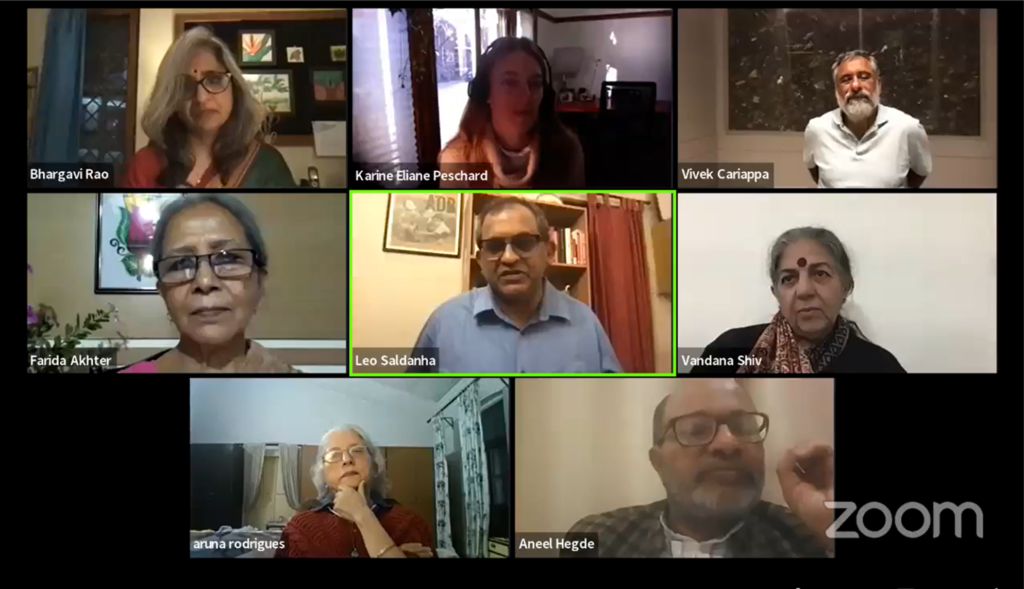
While studying Monsanto’s aggressive role in their fight for IP rights, Karine deduced that corporations often took advantage of grey areas to prey on farmers and seed rights. They often devised IP systems that rendered these countries’ legislation moot, practising a form of IP imperialism. Certain factors such as lack of legal challenges and expertise pertaining to patents, hype surrounding biotech crops, and cooptation of key institutions, enabled companies to exploit farmers. The tacit understanding that the government would recognise Monsanto’s IP rights even in the absence of a patent is problematic and a violation of the patent law. And this concern is real at the national as well as regional levels. This could be a way for the government to maintain good relations with these companies, in order to secure access to the technology for the country’s economic interest, but it has consequences to seed sovereignty and farmers rights.
Karine concluded by saying that such legal action and challenges mounted by civil society organisations is critical to protect seed sovereignty and farmers and consumer rights as well. She said “despite mixed results in the courts, these cases have created precedents and “opened cracks” in the dominant legal interpretation.” Beyond the courts, there has been development of IP and patent validity expertise. In addition, it has exposed how private IP systems subvert domestic legislation and how public-private partnerships blur the line between public research and commercial exploitation, and public and private interest.
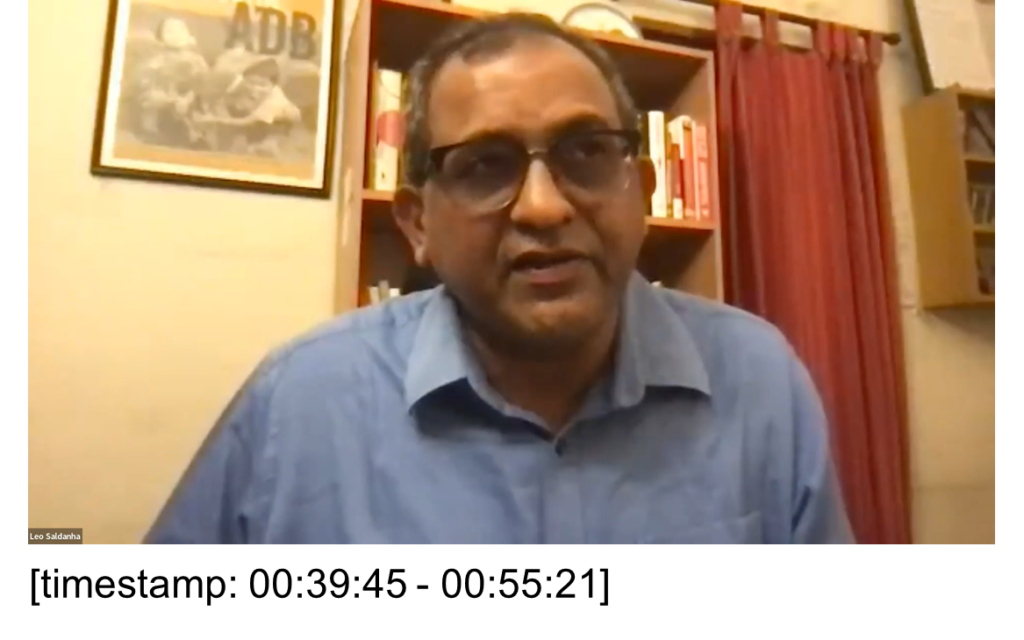
Leo Saldanha began by emphasising that the struggle to protect seed sovereignty is harder now with most governments aligned with corporate interests. That agri corporates focused on profit and profiteering even is indicative, he said, in how Monsanto chose brinjal for modifying into a transgenic crop: it grows everywhere, is very accessible, affordable, nutritious and popular and accounts for 10% of vegetables consumed in India. Taking control of brinjal as a commodity and as a proprietary product (B.t. Brinjal), results in controlling the seed sales of this major vegetable of India.
While detailing the Bt. Brinjal case, he highlighted how the Genetic Engineering Appraisal Committee (GEAC) simply did not care to enquire if Monsanto et al had conformed with the BD Act in accessing local brinjal varieties before genetically modifying them into proprietary products. Neither did NBA, the custodian of India’s biodiversity. He shared how Monsanto claimed they got the local varieties from public universities, and thus had not violated the law. Meanwhile, public universities, which are meant to protect public welfare, had sourced these varieties from local farmers, and without informing them, and thus the question of consent did not arise even, went on to share them with Monsanto and Mahyco.

Highlighting that in India such violations are not merely civil infringements but criminal acts as well, given our environmental laws are based on criminal jurisprudence, he pointed to Justice Pachhapure’s judgement, rejecting the appeal of those accused of biopiracy to quash the criminal complaint, as an constitutional moment. That this order has been stayed by the Supreme Court now for about nine years, is a worrying instance of judicial delays causing not merely denial of the cause of justice, but potentially resulting in weakening of biodiversity protection regime. This is problematic also when considering the fact that environmental laws are being massively diluted by the Ministry of Environment, Forest and Climate Change (MOEFCC), being made pro corporate, and this includes BDA. ESG’s PIL must be viewed in this context, he said. Thus, it is not a PIL only about biopiracy in brinjal but is also an effort at securing BD Act’s strong provisions and ensuring its unconstitutional weak provisions that are being exploited to bioloot (such as Sec. 40) are struck down. He concluded by calling for collective action to protect the rights of indigenous, tribal, fishing, farming and agro pastoral communities who have protected biodiversity, and raised 1000s of varieties on which we all depend.
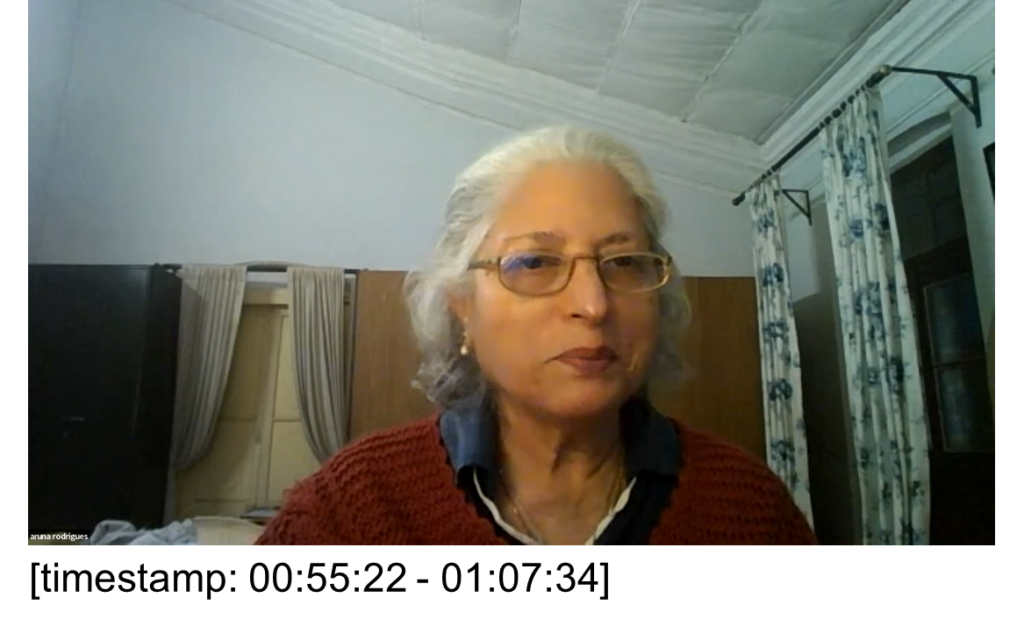
Aruna Rodrigues commenced by sharing how farmers have paid Rs. 14 thousand crores[1] of royalties in excess over the past 18 years, to buy proprietary corporate seeds. In the case of B.t. Brinjal, her PIL efforts in the Supreme Court, and that of others, forced the government to place the safety data in the public domain – one of first successes in seeing some real change. This led to the famous Jairam Ramesh moratorium on GM crops which was a revolutionary change in the government’s perspective. GM Mustard caught her attention in 2018 when the GEAC approved field trials, the Supreme Court was moved seeking a stay on its commercial release, following which an unwritten order was secured that the government would not move forward with the release. Which, not unexpectedly, they did not adhere to. The government claims that HT stands for hybrid technology, which an expert has confirmed is a concoction. The correct term is Herbicide Tolerant variety, whereby a foreign gene is inserted into a plant to protect it against a particular herbicide – thus it is a GMO.
She hoped that at the next hearing on 10th January 2023 the Supreme Court could be convinced India does not need the GMO mustard crop at least on two grounds: firstly, mustard is a crop of origin, or at least of great abundance in the region – there are over 4200 varieties; and secondly, HT causes grave harm to human and livestock health, and the environment, due to its toxic nature.

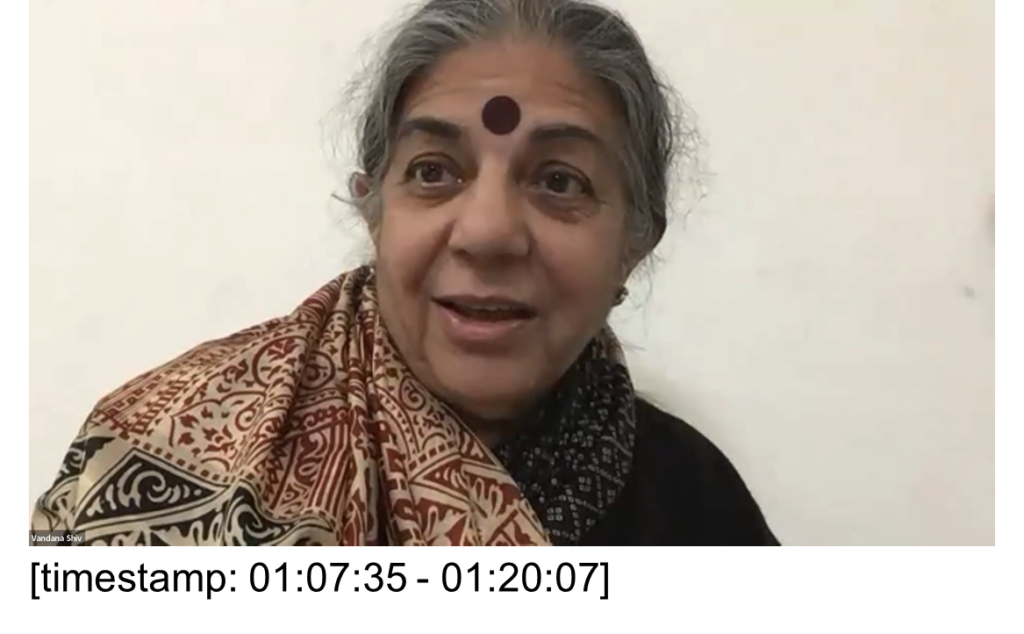
Dr. Vandana Shiva began by sharing how she started her seed activism in 1987 at a conference where genetic engineering was discussed as a way to take patents on seeds. The International law to enforce this became the TRIPS agreement of the World Trade Organisation (WTO), allowing a small number of companies to control all food and health products. Intellectual property, she explained, is designed to make securing seeds illegal. Such incidents compelled her in 1991 to begin campaigning against GMOs and also to organise saving seeds through Navdanya, involving the government and farmers. Out of this effort came two provisos in one of the most advanced Patents Laws, that of India: 3(d): do not allow evergreening in medicines and 3(j) plants, animals and their parts are not patentable. Which, she said, have become our pillars of sovereignty and are today being threatened by free trade agreements.

Vandana and her team have intervened in every case related to seed appropriation and used article 3(j) to knock down several patent claims. She shared this work (since 1997) is documented in books available in India as ‘Biopiracy: The Plunder of Nature and Knowledge’ in India and internationally as ‘Reclaiming the Commons’. She warned that these corporations do not merely violate the law but also make it, and hence we have to be innovative and creative to reclaim seed sovereignty, farmers’ rights and sovereignty over bioresources, as also over associated traditional knowledge and biodiversity. And this needs to be achieved by making it a global and popular phenomenon.
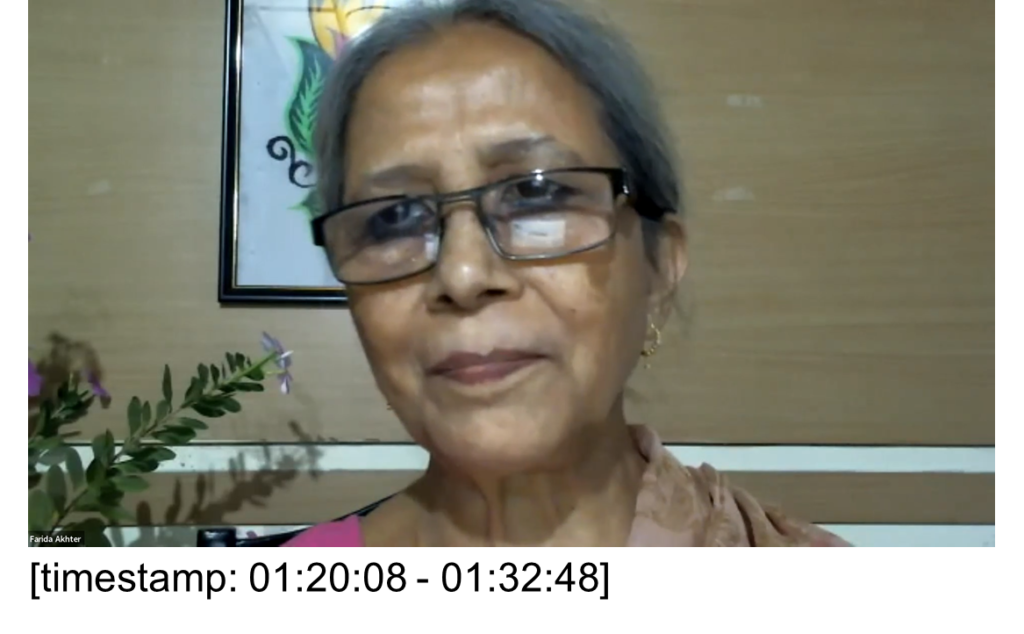
Farida Akhter began by saying she was quite intrigued when she found a chapter in ‘Seed Activism’ entitled: ‘Who owns Bt. Brinjal?’. That very thought had come to her when she was protesting against the approval of the commercial release of B.t. Brinjal in front of Bangladesh Agricultural Research Institute (BARI). Corporations entice farmers by feeding them false information that local varieties are at the risk of multiple pests and hence excessive pesticides need to be used, and thus pave the way for promoting Bt. brinjal on such false premises. That this proprietary product actually only avoids the risk of just one pest ‘eggplant fruit and shoot borer’, is simply not shared.
In spite of having 248 varieties of brinjals in Bangladesh, BARI developed 19 hybrid varieties to be commercially cultivated. In 2013, long after the government signed the agreement which preserves Monsanto-Mahyco IP rights for the technology, and when the approval process was in an advanced stage, it is then that people became aware of Bt. brinjal development – indicative of the deep collusion between corporations, academia, regulatory institutions and the State. She pointed to a section in the agreement which grants indemnity to Monsanto-Mahyco and Sathguru for any disaster concerning B.t. brinjal research, or post its release.

The Bangladesh law and stipulated regulatory authority were unfortunately very weak in safeguarding ecology, biodiversity and human health. Nine traditional varieties, named by farmers as Uttara, Kazla, Nayantara, Singnath, Dohazari, Khatkhatia, Islampuri, lost their identity once they were genetically modified and patented by these corporations. A case was filed with five petitioners which addressed the effects on local varieties getting contaminated, on the IP rights issue, a petition that pressed decisions taken in the lack of legal and regulatory regime to protect biodiversity and traditional knowledge would be a violation of the citizens’ rights. The case was dismissed in 3 months. Reports of field trials and consumption safety were not ever produced publicly, and in January 2014 the first batch of seeds were given out. Finally, the soil rejected the crop, the consumers did not like the taste and found traditional varieties to be much much better, making the entire exercise a colossal failure.

Vivek Carippa began by sharing how in the village he lives in and farms – ensconced within Bandipur and Nagarhole national parks – B.t. cotton was initially a roaring success and a marked jump yield was evident. But the yield reduced drastically soon after and that despite increasing pesticide use. And these genetically modified crops are often grazed by wild animals, not merely livestock, thus consuming high levels of toxic chemicals as well. There simply aren’t any studies at all about the implications of wild animals grazing genetically modified crops, heavily doused with toxic chemicals. And then, these chemicals wash into the rivers. Kabini from which Bangalore and several other downstream cities receive drinking water, receives a heavy dose of all these chemicals.
In mustard-growing areas of the north, where it is also grown all along the edges of forests, it is just as harmful for wildlife to consume such genetically modified crops along with its pesticides. Cow fodder is often contaminated by the herbicide use, resulting in high levels of morbidity. Herbicides like Roundup contain 15% surfactant called polyethoxylated tallow amine, making it water-soluble and allowing absorption by plants. Tallow amine, used as grease before, is now sprayed on our crops which leads to bioaccumulation in humans. These herbicides also end up polluting drinking water sources. He highlighted these aspects in an effort to penetrate the growing wall of public apathy. Commenting on the indifferent nature of society which protects only what we cherish, he asked, “How do you get somebody to cherish nature?”

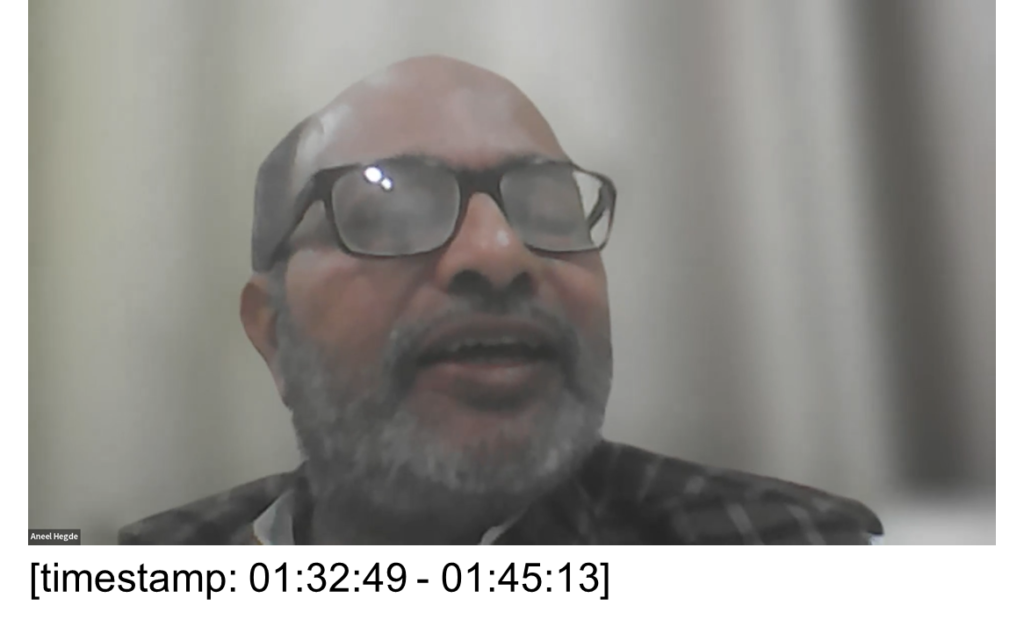
Aneel Hegde began by recalling the time when turmeric, neem and basmati rice was patented abroad, in the 1980s and 90s, and Vandana Shiva along with other activists fought the case in foreign and international courts to get the patents revoked. In 2001, the government established PPVFRA (Protection of Plant Varieties and Farmers’ Rights Authority) to prevent biopiracy. However, if ESG’s PIL is any indication, scientists who indulged in biopiracy have been made officials of PPVRFA.
He drew attention to the struggles of the 1980s and 1990s, when over 14 long years, there were massive global protests against multinationals, the General Agreement on Tariffs and Trade (GATT) treaty and GM crops. Alongside, there were multiple efforts to save seeds from corporate takeover, and he shared how he managed to save 134 varieties of paddy in Bihar. In the Bt. Brinjal case, he wondered how the Centre approved it when several State Chief Ministers protested against the field trials, and in writing.
Drawing attention to the recent amendment to the Wildlife Act in the ongoing winter session of the Parliament, he said he has made a fervent appeal to treat GMOs as invasive alien species and as a direct threat to wildlife. He also shared that he has raised questions on the potential impact of GMOS and associated herbicides and pesticides on bees, as well as large herbivores such as elephants. He ended with the assurance that he would continue his efforts to protect India’s biodiversity and farmers rights as a Member of the Parliament.


During the Q&A session, Odenda Lumumba of the Kenya Land Alliance shared how the new government in Kenya wants to import GMOs claiming it would help tackle drought and food shortages. And that there is a controversy over GM maize being shipped from America and is bound towards Kenya. There is no clarity on the effects of this decision on farmers. Commenting on the recent stay on importing GMOs by the Kenya High Court, he said the situation is dicey. The strategies discussed during this webinar, he said, will be useful in putting up a resistance against the manipulation propagated by the new government.
Alejandra, a participant from Mexico, enquired about the parallel strategies along with the PIL from farmers or adivasis, that could work against patent life forms. Vandana Shiva responded saying community seed banks are the way to go, as seeds never belong to individuals, they have always been a common pool resource. It is one way to fight intellectual property over seeds and monopoly by corporations. She went on to explain how such collections support resilience, important in the context of climate change: some are salt tolerant, flood tolerant, some drought tolerant. And such varieties must be preserved and protected to help farmers through unprecedented natural calamities that are impending. Shiva also added that festivals are important to remember cultures, allowing us to remember things that we love, and recalled Vivek’s expression – that you can only protect what you love. To which Alejandra added that Mexico also has a lot of community seed banks in the south and wondered about their sustainable governance. Vandana pointed to the importance of not centralising these banks, but to diversify. Because there are different seeds in different regions. Such a movement cannot stop, it can only grow throughout the world.
Bharat Mansanta drew attention to the recent statement of the India Seed Sovereignty Alliance: India’s Seed Sovereignty Declaration, and invited people to spread the word and the idea globally.
Speaker profiles
Karine Peschard, author of Seed Activism, is an Associate Research Fellow at the Geneva Academy of International Humanitarian Law and Human Rights, where she conducts research on the rights of peasants, in particular the right to seeds. She is also an Associate Researcher at the Albert Hirschman Centre on Democracy, Graduate Institute of International and Development Studies. Her expertise and publications relate to intellectual property regimes in agriculture, agrobiodiversity, legal activism and seed sovereignty, with a regional focus on Brazil and India.
Aruna Rodriques is the lead petitioner in the Supreme Court of India challenging the release of Genetically Modified Organisms (GMO), particularly in food crops, on a variety of socio-economic, environmental and public health grounds. She has over two decades collated, arguably, the most authoritative evidence from around the world why GMO foods are unnecessary for India and how it presents a clear danger to food sovereignty, food security and farmers rights over seeds.
Dr. Vandana Shiva, a world-renowned environmental thinker, activist, feminist, philosopher of science, writer and science policy advocate, is the founder of Navdanya Research Foundation for Science, Technology and Ecology (India) and President of Navdanya International. Trained as a Physicist, she shifted to interdisciplinary research in science, technology and environmental policy. In 1982, she founded the Research Foundation for Science, Technology and Ecology (RFSTE), an independent research institute that addresses the most significant problems of ecology of our times, followed by Navdanya (‘nine seeds’), the movement in defence of biodiversity and small farmers, two years later.
Farida Akhter, Executive Director UBINIG (Policy Research for Development Alternative) and organiser of Nayakrishi Andolon, is a petitioner in the Court case against the approval of Bt brinjal, having done extensive field research on Bt brinjal before and after approval for field cultivation. She is a Member of Coalition against GM crops in Bangladesh and has researched Golden Rice and other GM crops. UBINIG also runs the Community Seed Wealth centre which has a collection of over 2500 rice varieties.
Vivek Cariappa is a self-taught organic farmer who farms with his wife Juli and their sons in Nugu valley between Bandipur, Wayand and Nagarhole forests. He has been active in farmers’ protests against GMO and is now working on tackling the spread of toxic herbicide tolerant crops in eco-sensitive zones. He has recently authored “On the Canvas of my time: Our Search for Sustainability“.
Shri Aneel Prasad Hegde is a Member of Parliament (Rajya Sabha). He has served as National General Secretary of the Samata Party and Janata Dal (United) when George Fernandes was its President. He has conserved (and grown) 134 varieties of paddy seeds in Udupi District. He coordinated in Kandla, Gujarat a campaign against a project of US multinational Cargill Inc. which resulted in the company’s withdrawal. He has over decades worked with campaigns against the 1994 GATT treaty which laid the foundations for according patent rights to corporations over seeds. His patriotism and struggle to protect farmers rights has resulted in over 4000 arrests, and also serving time in Tihar Jail with veteran trade unionist and former Defence Minister of India, late George Fernandes.
[This report has been prepared by Amrita Menon, a consultant at ESG and Leo Saldanha, a trustee of ESG with inputs from Sachin, Kirthana, Samyuktha and Nidhi]
[1] $ 1.7 billion

